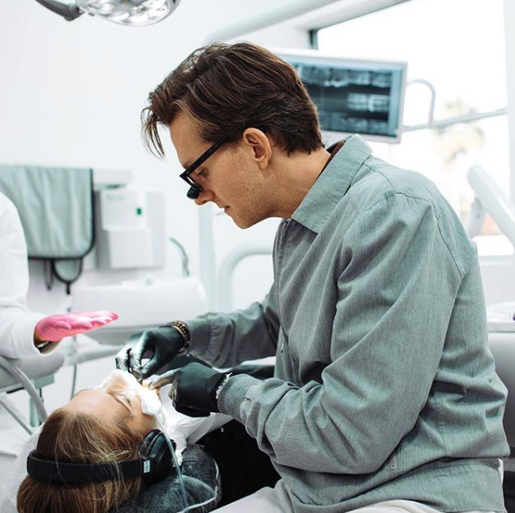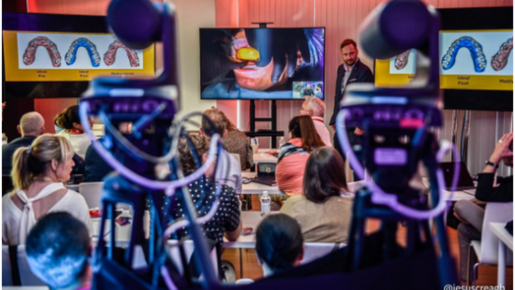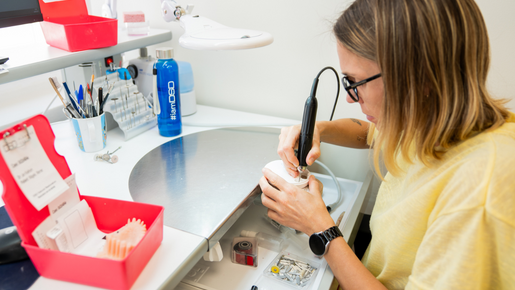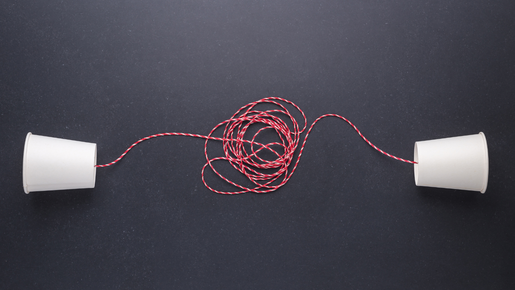
By Digital Smile Design
⋅ min read
⋅ Updated Jun, 2024
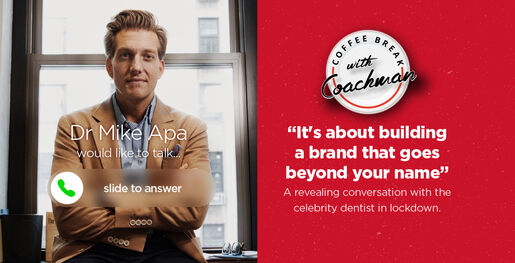
Dr Michael Apa recently had a virtual conversation with Christian Coachman about his career thus far, Covid-19 and everything in between. If you missed this revealing insight into how Dr Apa created his brand and his unique approach to dentistry, you can watch it again here.
Below is a summary of their discussion about running globally successful esthetic dental rehabilitation clinics. They focused on the importance of surrounding yourself with great people, the journey a new patient goes through, creating a total patient experience, and passion as the best marketing strategy. Read it here!
👇🏻👇🏻
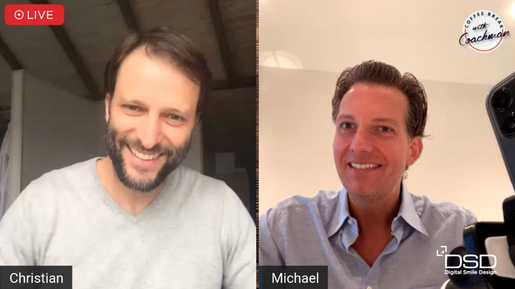
Build a brand that goes beyond your name
Michael Apa brings high-quality esthetic dentistry to clients around the world with three offices in New York, Dubai and Los Angeles, as well as his own line of oral care cosmetics, Apa Beauty. He talks to Christian about how a brand shouldn’t just be about you as the owner, but your whole team.
Dr Michael Apa
“It's always challenging when you bring in associates to work with you, and rarely do we ever call people ‘associates’ because they're not. First of all, they come in as a team member, and I think that's a critical difference in how you even think of them and talk to them. Because my whole thing with everyone is, here's what we have to do, here's who we have in the office, these are the kind of numbers that we need to reach, and this is the level that we're going to get to. And there's a lot of motivation in that, but I think what's happened, and it happened probably over the last three or four years, is that being in our clinic with the availability of the tools; the in-house lab, the trained staff, the assistants, which we'll get to; the system that's already in place is invaluable. We're giving you every possible edge to be uber successful in cosmetic dentistry if that's what you really want to do.”
Christian Coachman
“When I'm teaching a little bit about branding and planning your career on our courses, I usually tell people that a good strategy is to find a brand for your office that goes beyond your name because it's easier to bring people on board… on the business card, they don't have your name above their name; they have a brand that they can feel like they own a piece or they can maybe one day own a piece. Now, what I see happening with you is that your name has already become the brand.
So people don't get into that ego thing; "Oh, it's his office, not my office." And you're like, "Because a brand that's helping me, it can help you, and can help everybody here."
Dr Michael Apa
“Exactly. And when you make it not about Mike Apa and you make it about the ceramists and the dentists and the process and the offices, all of a sudden you're not coming to see me, necessarily; you're coming to our clinic. I mentioned this a long time ago when I told you about the Giorgio Armani thing, right? My thing was always that, fashion designers, who at one point were custom making suits or dresses for women on their bodies and became well known, and then opened a showroom and then opened a store; it happens in the same way. Why can't dentistry do the same thing? When you go in to buy an Armani suit, you're not going to see Giorgio Armani; you just know that it's a trusted brand and that you want to buy one of his suits.”
Your relationship with your assistants should be a symphony
Michael Apa has always understood the importance of a team working together successfully to produce the best outcome. Here he talks to Christian about the importance of the relationship between him and his assistants:
Dr Michael Apa
“Kathy and I are like a symphony, I would say. There is no wasted space in our movement. Any gesture, nod, eye thing, hand motion; it's just totally in sync. She's traveled with me through three children. We've gone to I don't know how many different countries, different palaces. I was talking about it the other day and was like, "Do you know the amount of people that are wearing teeth from us? From you and me personally?" I mean, all these times we used to go to a place in the middle of the night, or flying somewhere... I mean, just crazy stories.
But how did it start? It started out of one room. And Kathy is the type of person that really takes her job... she feels so proud to be with... part of what we're doing. And she became a leader to the dental assistants and she didn't do it by telling people, "Do this, do that..." people just saw our work ethic. Dentists that came on saw my work ethic, assistants that came on saw how I treated her and saw her work ethic. And they wanted to be a part of it, so they learned and really understood what it was to sit at the chair with me. And now I have seven assistants in New York, five of them are ‘Kathys’. In Dubai I have three of them that are ‘Kathys’, in LA I have three of them that are ‘Kathys’.
I think because everything is so transparent, lives are so transparent now, that people see really how you are. I think what's happened to me over time is I have taken that to a different level of trying to really be a good person and inspire my team. Whether it was when I was actually running the team or when I was an employee, the people that I surrounded myself with, my ethics towards life and work, I think that's what made people want to be a part of it and give their best effort.
So I think when you start to encourage people that you think are good or can be good, it becomes contagious and you can get 50 ‘Kathys’. Maybe not Kathy, but you can get 50 80% or 85% Kathy's, which is an amazing thing, just by really making them feel like they're doing something special. And I think that has been the underlying principle of everything that I've done in all of these practices.”
Your Treatment Coordinator is a key role in the clinic
The treatment coordinator is a critical role who brings the patient into the practice – Michael Apa explains how the process works in his clinics:
Dr Michael Apa
“Her name's Jackie. She's still there and she's still amazing. In fact, she is – right now, while we're doing this – arranging FaceTime schedules every day for me while we're not at work. But look, I think that people need to know it's not about finding that one right person. Here's what I always say. Because hiring people, you can drive yourself crazy. Looking at resumes, getting references and you never really know – and I think we all know that, you never really know. Like you have your intuitions and you can have all the data, but until six months or a year goes by, you really don't know if that person is what you thought or thought they could be, right? And what I feel is that I hire on instinct. It's usually within the first minute of talking to the person. If I think that they are suited, I'm like doing a master puzzle piece in my mind, like what office, what is the team like? Will they fit in? Is it the right energy? So on and so forth.
So for the treatment coordinator, we have one in each office. So I have Masa in Dubai. I have Bridget in LA. And I have Jackie in New York, which interestingly enough, in New York I'm kind of running like a test right now. It's to see, because it's the most exciting part I would say, of being... they're not front desk, but being quote unquote front desk is interacting with those patients, making the sale, feeling good when they come out and saying yes, I booked that patient. It's an exciting position that I want everyone to feel because I think it keeps people motivated. So I started to train each person in New York to do that.
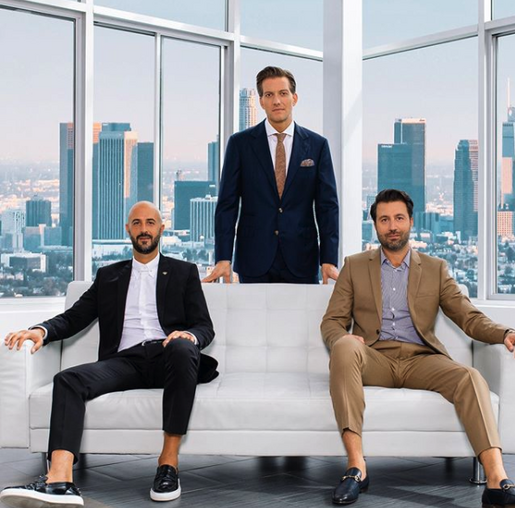
So there's four of them now. So basically when the new patient consults come in, I just forward them to different people and I try to split them up. Jackie has been doing it for 20 plus years, so she's super trained and she really understands. But you always need a fresh perspective on everything that you do. You can't just get caught up in doing it one way, because the way that our office was even five years ago is completely different than it is now. So it's good to have other people doing it.
But the role of that person is basically bringing the patient into the practice. So how they do that first phone call is critical. The information, I mean I'm just a small detail, we go back and forth a hundred times. People want to call and ask for fees. And once you give a fee, it's like how much is the Ferrari? Well, hold on a second. Let's first back up, and then talk about how special it is. So do we give fees? But then if we don't give fees, are they really qualified people? So there's a whole list.
There's a process of even how that first phone call works that I'm constantly tweaking. I'm listening to how people make that phone call and saying instead of saying that, turn it around a little bit.
But then you also have to balance that out with being constructive and building people up to feel good about doing that phone call, because that's 90% of it as well.”
Get the patient experience right
Michael Apa has refined his clinic systems to be replicable across all three of his clinics and delivered to the same standard by each clinic team. Here he explains how this works:
Dr Michael Apa
“But the first phone call, they get qualified, right? First they have to find you. How are you getting to people? That's number one. Second, why are they picking up the phone and calling your office? That's two. Third, are they pre qualified? That's three. Then how does that patient coordinator get them to actually make the appointment and come in? That's four. And then if they come into the office, and this is what I say to the team all the time, we should have a 90% closure rate on new patients that actually walk into the office because we've already created all this filtering of the mass population that calls to try and get these appointments. If they're walking in the door, and that phone call was done well and correctly, there's no reason that we shouldn't close. It's a failure on our part if they walk out and say oh, I need to speak to my husband, or oh, I'm not sure, or oh, I want to think about it. It's a failure.
We don't have foot massages, or any of that. We just have quality stuff and a good process. But the energy is high. Like you were saying, music in the lab, music is everywhere in our office. That vibe is carried throughout the operatories, waiting room, everywhere. So when they come into that consult room, she's trying to figure out things for me to key in on. Is it esthetics? Is it function? What's the timeline like?
She talks to the patient first. Yeah, and she takes down notes why they're there. Like basically chief complaints you would say in the dental world, but we don't say chief complaint. So she's getting that information, so when she gives it to me, I'm keyed in on what I want to talk about. So I've already geared my conversation towards why they're there. If they're interested in function and I go in talking about I can make you the most beautiful teeth, I've lost the patient. Right? So it's critical to have that information to go in so that you're really prepared on what to speak about. So then when we go into the consult room, it's more about creating the experience, giving them all the tools.”
The patient relationship with the final ceramics
In the ‘Apa Experience’, the patient wears their temporary smile for a few days to experience how it looks and feels before returning to give feedback on whether it works for them. But how can you be sure that the patient is ready to move from provisionals to permanent? Christian and Michael Apa discussed this point:
Christian Coachman
“What is the process that you go to minimize the risk of the patient complaining about the final ceramics? The questions that you do, the pictures that you take, what is the conversation with your patient about the prototype that you do to really understand if the patient is ready to sign up?”
Dr Michael Apa
“Yeah. I'm 42, going to be 43 this year and it's something that I honestly, within the last year, I've just actually learned. I used to think that there were crazy patients, good patients, patients like all those topics that you just listed. I used to think people were actually categorized in those categories. Now, obviously there are patients that we're never going to be able to make happy. It's a very small percentage, but they're there. The majority of patients, now here's where it gets a little tricky, can be lost or recaptured all in how everyone on the team treats those patients.
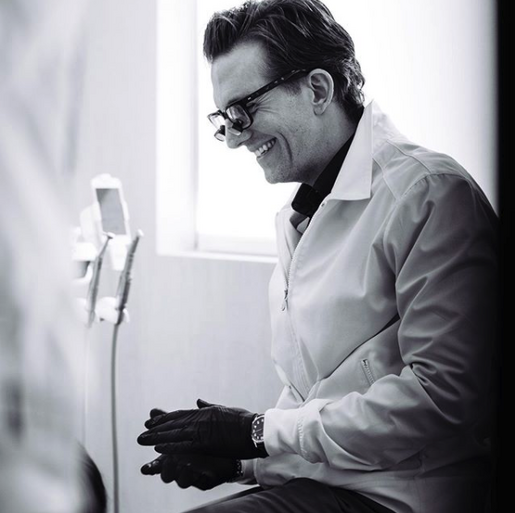
You assure them time, your lab, any of those things comes into ... your assistant was rude to them or didn't allow them to speak. They can change mid course, and they can turn into a nightmare. The real trick is having a protocol that you know that you can follow every day the same way with every patient. When you start introducing new things into your protocol, that's when problems happen. So I think that again, we constantly have to shift and change how we schedule the total experience – is what I'm going to call it – of the patient's treatment at our clinic. It's very critically important and it takes every person on board. It's not just me. And I think when you have that total experience on board and you can rely on your team to take some of that energy away from you, because you can't foster it all yourself. You can't give 100% of yourself to everyone all the time. You have to be able to lean on people to be able to absorb some of that shock therapy that you're going through, especially when you're working at this clip.
So, what I have found is that if you try to stay methodical in your process and you don't get emotional or offended or let your ego get in the way, and the other thing I always tell dentists is you're not treating for yourself. And I tell the ceramist, you're not treating for a lecture, you're treating for the patient. You want to put all this translucency and make it look beautiful and I'm telling you they don't want it. It's garbage. It'll look great for us when we put it on a gigantic screen, but they're not going to accept it. And so all of those things come into play. I would say that over 60% of my work is taking off somebody else's work, and the main thing I hear from patients is that he just didn't explain what I was getting. And then I got it and I hated it.”
Christian Coachman
“One thing I always say, this example, you put a provisional in the mouth, you ask the patient, "Do you like the provisionals?" And the patient says, "Yeah, I'm happy." And then I say, "But can I copy paste into the final?" And then the patient is, "No, no, no. I like them as provisionals, but the final would be much better, right, doctor? That's exactly the point. The workflow means copy paste. It's a prototype so let's go deeper and understand what is not good. So on this consultation when they have your provisionals, they use the provisionals for a couple of days. So they really saw themselves with that design, right?
How do you guarantee that the patient is really comfortable? It's just experience and psychology?”
Dr Michael Apa
“No. No, there is no guarantee, but here's what I'll say that I also hear a lot, and this is something that I think is really valuable that I didn't really understand either. As dentists, there's a fine line between making sure that the patient knows that you're listening to them and being patient and understanding of everything. Most people, and think of it like interior designers, and this is the parallel that don't always draw, you want to hear them in the consultation and then you want to suggest to them as a professional. Now, you don't want to hear them in the consultation and then keep asking them what they want because then they get crazy. What color do you like? Do you like this color? No. They want you to suggest what you think is best for them. That's why they're coming to you as a professional.”
How do you bring people into your practice?
Michael Apa has always been acutely aware of the importance of marketing in the right places and harnessed trends at the right time, as he explains to Christian here:
Christian
“To cover this overview of the Apa Corporation, I want to ask you a final question because yes, success comes through hard work and really delivering quality. You couldn't survive more than three or five years doing only good talking and not delivering quality. People are coming back, people are happy, people are talking about you. Word of mouth is still a great way to get patients, but of course, you have an amazing strategy to bring people to your office.
You were among the first ones to really take advantage of social media in a way that really built your brand. When was the moment? Of course, it's impossible to talk about all your marketing strategies here in a few seconds or few minutes, but if you could mention the most powerful decision you ever made when it comes to making people know that you are doing a great job, what was that one thing that you did that really took you to a different level in terms of exposure and awareness? From all the actions that you planned for the last 10 years that I've been following, if you could, pick one that you really enjoyed, that you thought: ‘Wow, that was a great decision,’ what would it be?”
Dr Michael Apa
“I'm going to put it into context before I give you the answer. People have always said to me, you're a great marketer, and I always hated that because it sounds like I'm a great car salesman. The reason I don't love that is because, look, at the end of the day, and you know this, if you don't really love what you do, if you don't truly love what you do to its core, first of all, you can't do it at this pace. And second of all, you know that it doesn't really ...
The money is nice and it's great, but at the end of the day, and this is going back to COVID-19, you can take away all my shit, all the things that I have in life, except for my family, but you can't take dentistry away from me. And I know that no matter what, even if it's just with Kathy, I can still go back in and do this dentistry. And that's what keeps my mind okay. That's the level of passion that I have for doing what I do, and that's always been there. There's never been a day in my life since I started doing this, where I felt like, "Oh my God, I have to go to work again today." And that's why I'm able to do it so much.
Dr Michael Apa
“So in terms of marketing though, I will tell you a couple things, just basic points. Number one is you got to love it. Number two is I had been doing PR long before social media and had been written up in many magazines that the general public reads at a certain level to people thinking about doing their teeth. So I was long ahead of the game with an actual reputation before social media came about.
I already had celebrity patients, I already had international clients, all those things that you need to be able to put meat on the bone, so to speak. When social media came out, and it's not the same anymore because it's a saturated market, I was one of the first to put before and afters up, which I thought was my hardest. And the reason I knew it was going to be so powerful on social media is because every time they would do an article about you in Vogue or Elle or Harper's or whatever it was, they never showed pictures. So it was just type, you're just talking, and you sounded like everybody else. When you could put your own pictures up and you could control that environment is when I saw a real ability to differentiate yourself. And I still think that's true today.
But then the last thing I did, and this is where I think that it's a saturated market now, and I was able to catch it at a point, and this was 2015 where it was unique was I took real influencers, which everybody is an influencer now, but back then there was actual influencers and did these procedures on them to show to their audience before everybody was doing it. And that, 2015 is when I opened Dubai, is when I bought Larry out and recreated New York, and that is really what allowed me to open LA. And I don't know if that time has come and gone or if that's still a possibility, but that was a unique capture in a unique time that I think has really changed things in my life. Yeah, for sure.”
A message on the COVID-19 outbreak
Christian Coachman
“My friend, a final message for our community. How do we go through this and get to the other side of the tunnel as a better person, as a better professional, in a positive way? A final message from one of the biggest names of our profession, please.”
Dr Michael Apa
“The final message is this. Look, you can't predict, no one. This is unprecedented. You're not going to be able to predict when we're going back or what it's going to be like or what the PPE is going to be, which there's just so many things that we're trying to answer now, and that's the bad news. The good news is everyone in the world is going through this. And I promise you, just like ... I don't know if we were talking about this live or talking about this by ourselves earlier, right now, we're just getting used to staying in and not interacting the way that we did. We're not getting on planes, we're not flying around the world, we're getting used to that. I think in some short period of time we're going to have to get used to the next phase, but we're all going to get used to it together. And if you start to think all the way down the road, what is it going to be like? If you told me a month ago that I was not going to be working anywhere, and that I was going to have to be paying salaries and figuring out strategies, I would have panicked, I would have had a nervous breakdown.
But because it happens day by day and we evolved into dealing with the situation that's in front of us, it doesn't hurt as bad or it doesn't seem like it's that big of a deal. It's just you get up, you get your head straight, you deal with the day, you go to sleep and you do it over the next day. And I think that obviously, it's going to go away, and we're going to be back to some new normal. How we will be, you can't predict and you can't waste your time and efforts panicking about it in the future. You just got to deal with each day, do your best and I promise you I'll be cutting teeth again. You'll be changing the dental world and all of this technology and life will go on. Maybe it's not going to be exactly the same, but maybe that's not such a bad thing either.”
